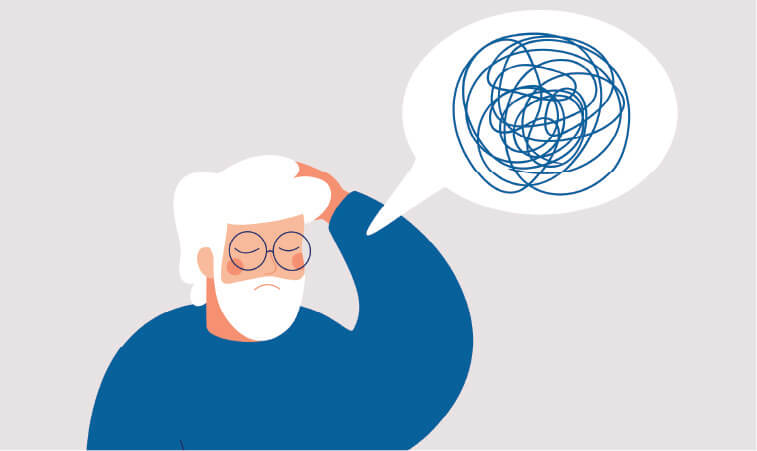Adults with Attention Deficit Hyperactivity Disorder (ADHD) may exhibit a wide variety of symptoms, some more well-known than others. While some of the more well-known symptoms of ADHD include difficulty concentrating, hyperactivity, and impulsivity, patients rarely exhibit ADHD exactly alike. This can make receiving a diagnosis difficult, but recognizing some of the less common symptoms may help in pursuing the correct diagnosis for your condition.
In this article, we will delve into the lesser known symptoms of ADHD. While most people are familiar with the core symptoms of hyperactivity, impulsivity, and inattention, there are other symptoms that often go unrecognized. These lesser-known symptoms can significantly impact an individual’s daily life and shouldn’t be ignored for proper diagnosis and treatment.
While there are many common symptoms that are indicators of ADHD, you should never try to self-diagnose or self-medicate through the internet. If you suspect that you have ADHD, speak to a medical professional on Klarity today. Klarity connects patients with healthcare providers for simple, accessible, and convenient online ADHD treatment.
Take our short online assessment and schedule an appointment with a provider today to discuss your symptoms and receive a diagnosis or personalized treatment plan for your ADHD.
ADHD Overview
ADHD is a neurobehavioral mental health disorder characterized by impulsivity, hyperactivity, and short attention span (inattention). ADHD is present throughout a person’s entire lifetime, so an adult diagnosed with ADHD likely had it as a child but was simply not diagnosed earlier.
In general, ADHD presents itself differently in each individual. Some may have a high concentration level with things that interest them, while others are continuously challenged to concentrate regardless of interest. Some patients may be highly social, while others are withdrawn.
Just as no two people with adult ADHD express the disorder precisely alike, there is also no “one size fits all” treatment. A majority of patients benefit from a multi-phasic treatment plan consisting of diagnostics, pharmaceuticals, counseling, behavior modification techniques, and ongoing care from an experienced provider.
Noticing symptoms and suspect you have a mental health condition? Take a free self-evaluation on Klarity today.
Types of ADHD
There are three main types of ADHD, each with its own associated symptoms:
- Inattentive Type
- Hyperactive/Impulsive Type
- Combination Type
Inattentive Type – Below are the most common but not all, symptoms associated with inattentive type ADHD.
- Carelessness resulting in mistakes
- Inability to stay on task
- Inattention/Not appearing to listen/Mind wandering
- Inability to follow or comprehend instructions
- Task avoidance, especially for tasks that require sustained attention
- Distractedness
- Forgetfulness
- Difficulty focusing
- Procrastination
- Difficulty in organizing tasks (i.e., poor time management)
Hyperactive-Impulsive Type – Those with this type can have any combination of the following symptoms, and more.
- Inability to remain still, i.e., fidgeting/squirming
- Getting up often when seated, i.e., moving away from the workplace
- The necessity to “burn off” excess energy/restlessness
- Irritability
- Inability to work quietly
- Talking too much, inappropriate conversation patterns
- Interrupting
- Often “on the go” as if “driven by a motor.”
Combination Type ADHD-
As the name suggests, individuals with combination ADHD display a combination of both inattentive and hyperactive/impulsive symptoms. One of the challenges with diagnosing combination type is that the symptoms may not always be obvious.This can make it difficult for healthcare professionals to differentiate between combination ADHD and other conditions, such as anxiety or depression.
Combination ADHD is not the same for everyone who has it. Some individuals may experience more symptoms of inattention, while others may struggle more with hyperactivity and impulsivity. However, in general, combination type is characterized by a relatively equal amount of both types of symptoms, which can significantly impact a person’s daily life.
Well-known ADHD Symptoms
There are certain groups of ADHD symptoms that are more common than others, including:
- Concentration and Focus Related
- Being easily distracted
- Inability to stay on task
- Hyperfocus – the ability to remain laser-focused on a task while shutting out everything going on around you
- Daydreaming
- Disorganization and Forgetfulness
- Constantly losing items
- Procrastination
- Chronic lateness, missing appointments
- Messiness, clutter
- Impulsivity
- Inability to wait your turn
- Interrupting others
- Abruptly stopping or starting a task
- Saying things before they are thought out
- Emotion Related
- Anger Management Issues
- Depression
- Lack of Motivation
- Low Self Esteem
- Hyperactivity and Restlessness
- Inability to fully relax
- Constant Fidgetiness
- Need to be constantly “on the go”
- Racing thoughts
Lesser-Known Signs of Adult ADHD
While the common symptoms mentioned above are more diagnostically prevalent, there are also lesser-known symptoms. Below are some of the less common signs that may help indicate whether you should seek a medical professional’s opinion on an ADHD diagnosis.
Sleep Problems
Trouble falling asleep and staying asleep could be connected to ADHD. According to the Sleep Foundation, both types of ADHD can manifest in different sleep disturbances. For instance, individuals with predominantly inattentive symptoms are more likely to get less sleep because they often go to bed later, while those with predominantly hyperactive-impulsive symptoms are more likely to suffer from insomnia. Those with combined hyperactive-impulsive and inattentive ADHD experience both difficulty sleeping and reduced sleep quality.
Time Blindness
“Time Blindness” is a term used to describe the way individuals with ADHD sometimes process time. In some cases, you may find that you are so hyper focused that you lose track of time, or in other cases, you fail to notice when you need to transition to another task. The inability to properly manage time affects every aspect of your life.
Severe Mood Swings
Abrupt changes in mood for seemingly no reason can be related to impulsivity and other behavior-related symptoms of ADHD. If you have these regularly, it is important to mention this to your medical professional.
Impulsive Shopping
Impulsive shopping and overspending are being recognized more and more during ADHD diagnosis, but it is a less common symptom. The inability to control “wants” is correlated with impulsivity symptoms of ADHD and can also manifest into substance abuse issues and chronic overeating.
Difficulty Forming and Maintaining Relationships
If you are having difficulty forming or maintaining relationships, it could be a result of adult ADHD. Inattentiveness to your partner, forgetting important dates and details, low self-esteem, and inability to relax are all symptoms that can take a toll on your relationships.
Lew Tolerance for Boredom
Boredom is a definite trigger for many of the more well-known symptoms of ADHD, such as hyperactivity and lack of attention to detail. Boredom can also trigger emotions related to impulsivity, such as anger. Having a low tolerance for boredom is also a coping mechanism to avoid it.
Anxiety
Anxiety is a widespread affliction, and it is increasingly correlated with adult ADHD. Feeling constant unease, racing thoughts, distraction, and missing details are hallmarks of anxiety as well as ADHD.
Hypersensitivity
Individuals with ADHD might exhibit the tendency to be hurt, offended, or suspect malintent more readily than someone without this condition. Low self-esteem is seen in individuals with ADHD; this goes hand in hand with how they may process criticism, either real or perceived.
Working Memory Deficit
Individuals with ADHD sometimes fail to be able to process stored information correctly. Working memory helps you to complete tasks with which many ADHD individuals have challenges.
If You Have These Symptoms, You May Want to Get Tested for ADHD
Pursuing a proper diagnosis is the first step in determining if you have adult ADHD and, if so, what individual treatment options would help you. The only way to get a professional diagnosis is by meeting with a licensed healthcare provider like the ones on Klarity.
ADHD Diagnosis and Treatment Has Never Been Easier
Find out if you might have ADHD with this free online self-assessment. We’ll then connect you with a licensed medical provider to further discuss your symptoms, provide a diagnosis, and prescribe treatment if applicable.







